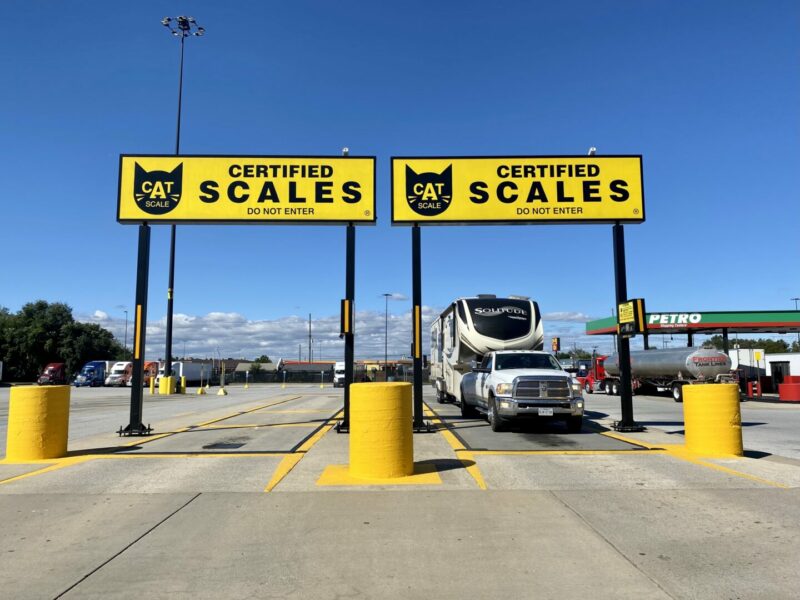Table of Contents Show
If you’re new to RV life, welcome to the world of acronyms. GVWR. CCC. GCWR. The list goes on and on. Although it might be confusing at first, knowing what these different acronyms mean is very important to your safety and the safety of other drivers.
It’s also essential to follow these guidelines should you have to file an insurance claim or if you need warranty repairs completed. Let’s take a look at the Gross Vehicle Weight Rating (GVWR) meaning, one of the first acronyms you need to learn before even purchasing an RV.
What Does GVWR Mean?
Gross Vehicle Weight Rating (GVWR) meaning is the total weight of a vehicle. This includes all of the cargo, the fuel and other fluids, and the weight of the vehicle itself.
The manufacturers measure the GVWR and provides that information somewhere on the RV. This number is essential to know so that you know how much cargo you can safely put into your vehicle.

How Is GVWR Calculated?
Before a vehicle is shipped to a dealership, the manufacturer weighs it and determines the amount of cargo that the vehicle can safely transport. Trucks, sedans, travel trailers, and motorhomes have a GVWR.
If you get into an accident while towing a camper, any warranty will be voided if you’re over the GVWR. Your RV insurance may also deny your claims. But it’s not just about money. Staying under the GVWR is about safety. Vehicles can only carry a certain amount of weight. If you overload your fifth wheel and the frame bends, your camper is totaled.
Where Can You Find the GVWR?
On a standard vehicle, the GVWR will be on a sticker on the driver’s door or under the hood.
On a travel trailer or fifth wheel, the GVWR will be on a sticker outside the camper. You can find this on the driver’s side near the front of the RV. It’s usually a yellow sticker and easy to locate.
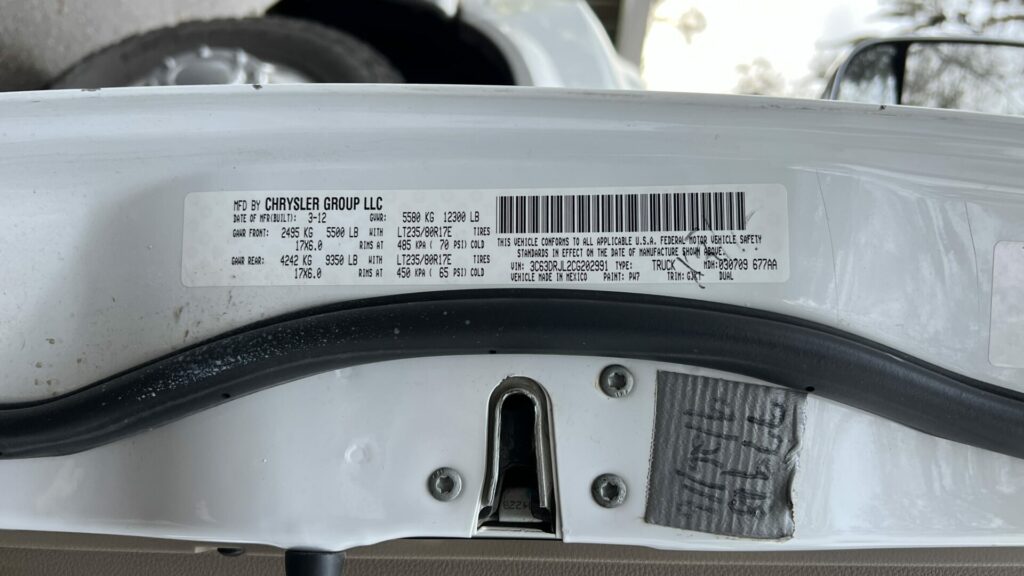
Is GVWR the Same as Towing Capacity?
The GVWR meaning and towing capacity are two different calculations. Travel trailers and fifth wheels don’t have a towing capacity because they don’t tow anything behind them.
Towables do have a GVWR, however, which is the total amount of cargo plus the weight of the empty camper. A truck, on the other hand, has both a GVWR and a towing capacity.
The GVWR of a truck is the weight of the empty truck plus the added weight of everything else – including fuel, fluids, cargo, and passengers.
The towing capacity is how much weight the truck can pull behind it. This has nothing to do with the GVWR.
What’s the Difference Between GVWR and GVW?
The GVWR meaning is the limit established by the manufacturer for that particular vehicle. Even travel trailers with the same brand and layout may still differ in GVWR, so it’s always important to know the GVWR for your specific vehicle and not just in general.
However, the GVW is the actual weight of the vehicle loaded regardless of the GVWR. If you drive your truck onto a CAT scale, the weight of your vehicle with the passengers and cargo is the Gross Vehicle Weight (GVW). This should always be below the GVWR to travel safely.
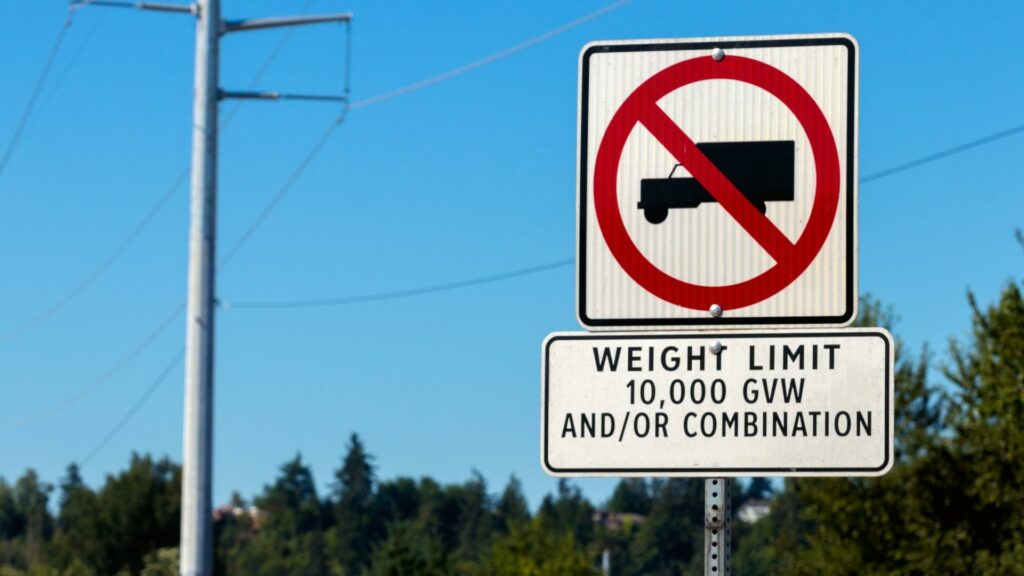
Other Terms You Should Know
There are lots of acronyms in the RV world. You’ll see “travel trailer” abbreviated “TT” and “cargo-carrying capacity” abbreviated “CCC.”
Some of these acronyms aren’t essential to know, but others are significant. Let’s look at a few more you need to know before heading out on that weekend adventure.
Pro Tip: If you’re feeling overwhelmed by new terms here, you might want to take it back a step. Read How to Decode Common RV Lingo to get the basics of RV terminology.
Gross Vehicle Weight (GVW)
GVW and GVWR meanings aren’t the same, as mentioned above. The Gross Vehicle Weight is the actual weight of the vehicle.
If you’re headed to a local campground and stop to weigh your Class C motorhome on a CAT scale, whatever number you receive on the ticket is the actual weight. This is the GVW.
Gross Combined Weight Rating (GCWR)
The GCWR is the combined weight of the tow vehicle and RV. The RV won’t have this number anywhere. Usually, you’ll need to go to your owner’s manual of your tow vehicle to find the GCWR.
Tow vehicles loaded down with cargo and anything else they’re towing shouldn’t exceed the GCWR. It doesn’t matter if you’re towing a flatbed trailer with landscaping equipment or a 42ft fifth wheel.
Gross Axle Weight Rating (GAWR)
Tow vehicles and motorhomes have a front axle and rear axle. Towable RVs have a right and left axle. Each axle has its rating called the Gross Axle Weight Rating (GAWR). Like the other acronyms above, this is the total weight permitted for safe travel.
You don’t want to overload one axle because this leads to unstable driving conditions. A towable RV is more likely to sway if the weight distribution isn’t even. If the tow vehicle has too much weight on the rear axle, you’ll need to move weight to the front axle not to damage the rear.
Pro Tip: If you’re not sure how you’re going to keep track of the weight of your RV, truck, or car, we’ve got you covered. Check out our instant downloadable Weights and Limits Workbook!
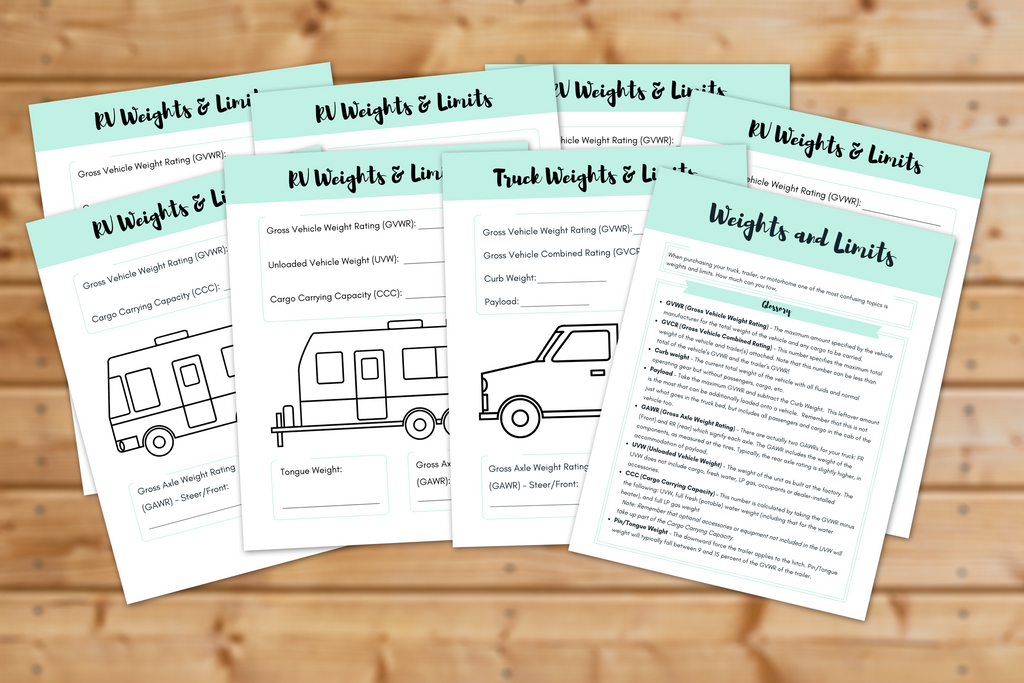
Gross Trailer Weight (GTW)
The Gross Trailer Weight (GTW) is the same as the GVW mentioned above. It’s the weight of the trailer when fully loaded. This is not the GVWR meaning, which is the maximum limit.
The GTW is the actual weight. When you drive over the CAT scale to weigh your tow vehicle and RV, you’ll need to weigh a few different times to get accurate measurements. One of these weights will be the GTW. Always make sure your GTW is under the GVWR for the RV.
Tongue Weight (TW)
This measurement only refers to towable RVs. The amount of weight placed on the tongue of the tow vehicle is the Tongue Weight (TW). The tongue weight is usually about 10% of the GTW. This is the force placed on the tow vehicle, the transferred weight. If your vehicle isn’t capable of handling the TW, then you’ll need to find a different tow vehicle or different camper. Even if it’s within the GVWR and has the towing capacity, if the TW is too much, it will put too much stress on the rear axle and possibly create unsafe driving conditions. Braking might be affected as well as the overall smoothness of the ride.
Dry Weight
The Dry Weight isn’t critical once you purchase an RV. This is the weight of the RV before you add any cargo. Manufacturers calculate the GVWR, meaning they add the dry weight and the cargo carrying capacity at the manufacturing plant.
When you read the sticker on the side of an RV, make sure to look at GVWR and not the dry weight when deciding if your tow vehicle can tow the RV.
Payload
Payload capacity matters when towing a fifth-wheel camper. This is the amount of weight placed in the bed of a truck. The payload capacity is just as crucial as the towing capacity.
Many standard trucks don’t have the payload to tow a fifth wheel, even if they have the towing capacity. The truck’s bed and the rear axle may not be for heavy-duty hauling.
Trucks with dual wheels have increased payload capacities because of the added strength to the back of the truck. This is why you’ll see many dual trucks pulling fifth-wheels.
Towing Capacity
As mentioned before, towing capacity is the amount of weight a tow vehicle can pull. The towing capacity should always be greater than the GVWR of what you tow.
This also refers to the amount of weight a motorhome can pull. Often you’ll see a Class A motorhome towing a car behind it. Class A owners need to make sure the tow dolly and vehicle aren’t more than the towing capacity of the motorhome. Class As have a large amount of towing capacity because of their chassis, so this usually isn’t a problem.
Food For Thought: Have you ever wondered Do RVs Have to Stop at Weigh Stations? Click the link to find out!
Why You Shouldn’t Travel Overweight
Traveling overweight can damage the RV. The frame can bend, which is irreparable. Being overweight can lead to tire blowouts because of too much weight on the tires. Unevenly distributed weight can lead to sway problems.
But the problems won’t just be with the RV. If a vehicle is towing too much weight, it will affect the braking system, the transmission, and the overall smoothness of the drive. You can damage your vehicle, which leads to expensive repairs.
Vehicles have a towing capacity and payload capacity for a reason. When you ignore those guidelines, you’re putting yourself, your passengers, and other drivers at risk. Accidents are more frequent if you don’t drive under the maximum safety measurements.
How Do I Weigh My Car, Truck, or RV?
Weighing a vehicle at a truck stop with a CAT scale is simple and easy. You’ll need to download the Weigh My Truck app and create an account. This makes the process quicker. It will cost $12.50 every time you weigh, and it’s worth it. You can also download the CAT scale locator app to find locations easily.
When you get to a scale, it only takes a few minutes. First, drive over the scale and place your tires between the yellow lines to weigh your axles separately. Open your Weigh My Truck app and enter the location code on the scale.
The next screen isn’t essential for your use, so just put in zeros and type “Freight of all kinds” in the Commodity field. Now you’ll sit and wait for the scale to weigh your car, truck, or RV. The app will then refresh to show your weights. All you need to do next is drive off of the scale!
If you want to drop your camper and weigh your truck separately to get a better idea of the truck weight and the camper weight individually, you can pull off into a truck parking space and unhitch.
Leave the camper and drive your truck over the scales and follow the same process. It does not cost $12.50 for this weight measurement since it’s considered a reweigh. This time it’s only $3 since it’s within 24 hours of the previous weighing.
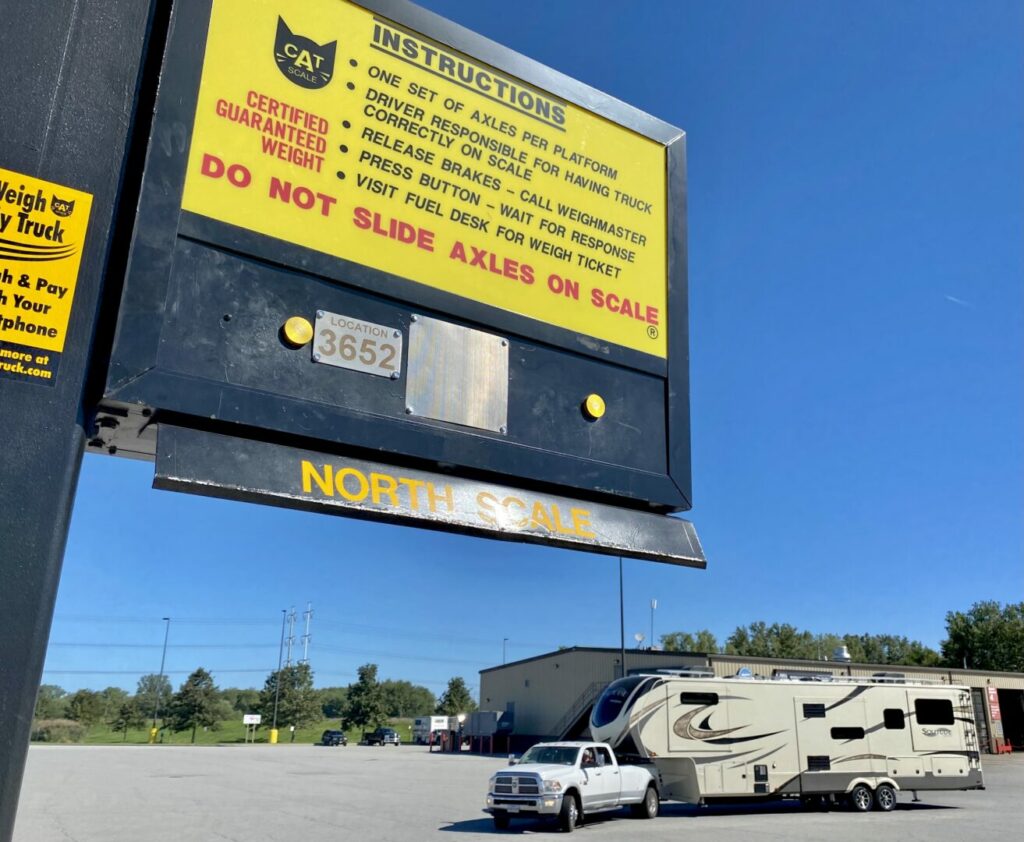
Travel Safe By Knowing Your GVWR
It is vital to your safety and the safety of other drivers for you to know your GVWR and the other measurements mentioned above. There are ratings for a reason.
Ignoring these limits puts too much strain on your tow vehicle engine and other systems. You’ll pay more for gas because it will be working harder, and you risk severe damage to the transmission. Your braking won’t be as quick either, which is a significant safety concern.
Know your limits. When you drive safely, you still have to worry about weather conditions or the occasional tire blowout. Still, your risks of getting into an accident or damaging your vehicle or rig are much lower. Have you weighed your truck or RV?




